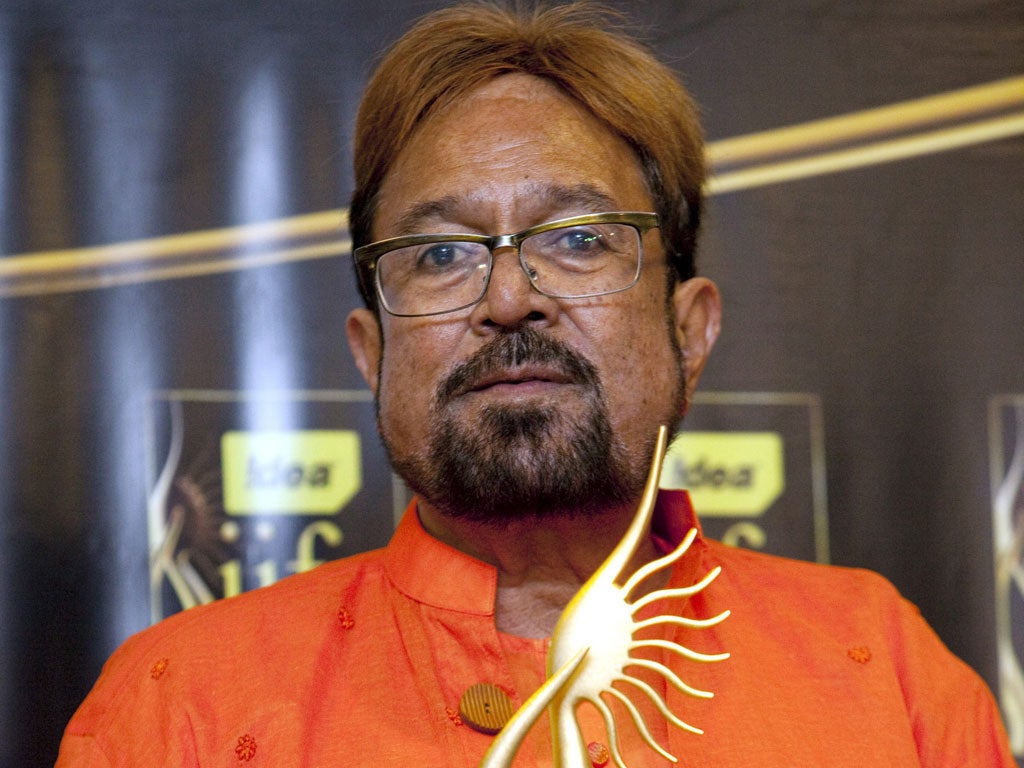Rajesh Khanna: Undisputed king of Bollywood in the 1960s and '70s

Your support helps us to tell the story
From reproductive rights to climate change to Big Tech, The Independent is on the ground when the story is developing. Whether it's investigating the financials of Elon Musk's pro-Trump PAC or producing our latest documentary, 'The A Word', which shines a light on the American women fighting for reproductive rights, we know how important it is to parse out the facts from the messaging.
At such a critical moment in US history, we need reporters on the ground. Your donation allows us to keep sending journalists to speak to both sides of the story.
The Independent is trusted by Americans across the entire political spectrum. And unlike many other quality news outlets, we choose not to lock Americans out of our reporting and analysis with paywalls. We believe quality journalism should be available to everyone, paid for by those who can afford it.
Your support makes all the difference.Rajesh Khanna, the first real superstar of Indian cinema, was the undisputed king of Bollywood in the late 1960s and early 1970s. Fans both male and female would send him letters written in their blood. "Women came out in droves to see him," said Sharmila Tagore, who acted with him in nine films. "They'd stand in queues outside the studios to catch a glimpse, they'd marry themselves to his photographs, they'd pull at his clothes… He needed police protection. I've never seen anything like it before or since."
Amitabh Bachchan, who was to dethrone him as India's leading film idol, said that for all the adulation he received he never generated the same kind of frenzy, admitting that he only became famous because he worked with Khanna, in Anand (1971) and Namak Haram (1974).
Born Jatin Khanna and affectionately called Kaka, he was an adopted, much pampered child. He acted at school and college in Mumbai, and after a stint in theatre made his largely unnoticed film debut in Aakhri Khat (1966). His fourth film, Aradhana (1969), made him a heartthrob, driving an open-top jeep while serenading Sharmila through the winding routes of a hill train in Darjeeling. Aradhana also marked the resurgence of singer Kishore Kumar, who became Khanna's playback voice for many years.
Later that year came Do Raaste, which consolidated his position at the box-office, and Khanna had an unbroken sequence of runaway hits until 1974. Even a Khanna cameo could bring a film success: his 15-minute appearance in Andaz (1971), where he yodeled Kumar's immortal "Zindgi ek safar hai suhana" on a motorbike with Hema Malini on the back, overshadowed the film's star, Shammi Kapoor. Khanna's success, indeed, overshadowed all his contemporaries, however illustrious. Khanna admitted there were times when he felt "next to god". His crinkling eyes and velvety voice drove fans into raptures, and the Khanna haircut, suits, and slacks that stopped short at the ankle made him a fashion icon.
He was in fact a gifted and sensitive actor who, despite his romantic image could also give voice to the underdog, as he demonstrated in Ittefaq (1969), a rare successful experiment of a Hindi film doing well without songs, in which he lent a vulnerability to the role of a suspected killer on the run from a psychiatric home, and Khamoshi (1970), in which he was similarly outstanding as a psychiatric patient. Probably his greatest performance, though, was a cancer sufferer the following year in Anand.
But Khanna could not cope with his superstardom. Later he admitted that he had not been mature enough to handle it; success made him arrogant, forcing producers and directors to give in to every whim and fancy, and when they saw a similar spark in Bachchan many shifted loyalties.
Convinced he could do no wrong, Khanna made bad choices, taking roles that exposed his limitations; his mannerisms became an embarrassment and without strong stories not even he could salvage poor films. He became a parody of the former superstar and audiences laughed at his attempts to pull off action roles, with which he was never comfortable, and at his maudlin sentimentalism. The 1973 BBC documentary Rajesh Khanna: Bombay Superstar came only just in time.
Like many film stars, Khanna went into politics, joining the Congress Party and entering parliament in 1992. He later appeared in several television serials, and also produced one.
In 1973, Khanna married Dimple Kapadia, who was only 16 and basking in the success of her debut film Bobby. They separated in 1984. Their elder daughter, the actress Twinkle Khanna, is married to the actor Akshay Kumar, while the younger daughter, Rinke, is also an actress and is married to a London-based investment banker.
Haresh Pandya
Jatin Khanna (Rajesh Khanna), actor, politician and television producer: born Amritsar, Punjab 29 December 1942; married 1973 Dimple Kapadia (separated 1984; two daughters); died Mumbai 18 July 2012.
Join our commenting forum
Join thought-provoking conversations, follow other Independent readers and see their replies
Comments